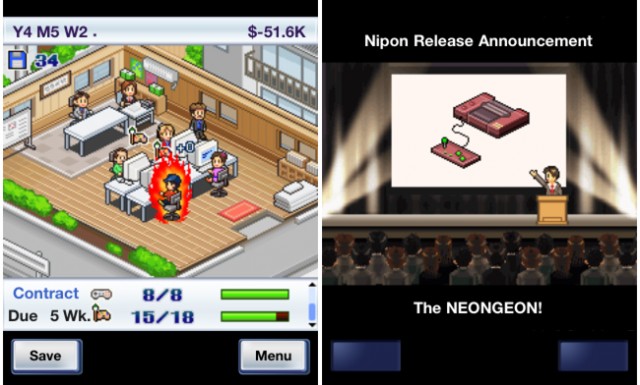
Many of my friends are playing the iPhone game GameDev Story, a quirky sim title that is as addictive as the first time we picked up SimCity or Oregon Trail. Though the game doesn’t have any social sharing features, each of us have been comparing the results of our gaming empires’ 20-year lifespan.
Though all of us have our own methods of working our gaming sweatshops, there does seem to be a sort of formula that helps advance our sales quickly. The following bit of advice is what some of us have been using to get to over a millions sales per game by the end of year 5, and our own blockbuster console by year 10.

The best advice for earning money in GameDev Story is to alternate between making games and doing contract work. As a game is complete and goes up for sale, immediately begin contract work. This allows a steady cash flow until the game goes off of market, from when you should start creating your next game. All-in-all, creating 3 games per year is recommended, with the rest of the time filled with attainable contract work.
Continue making games, but remember to advertise only WHILE you make the games. This helps to bring up Hype and Fame levels for your games (and company), which allows them to sell more when they release. Using advertising outside of game time development doesn’t quite have the sales punch.
Once you build up a bit of money, hire, hire, hire and level up/train your workers. You probably won’t be able to get any games over 100 for the first 5 years that your company exists, so training during that time is important. Essentially, each of your staff should be at level 5 for at least two professions.
Speaking of professions, try to have two staff members as Writers, two Sound Engineers, and two Designers. This allows the switching back and forth of lead developer when creating games. Using the same person two games in a row for one specific task taxes them, and the game’s stat levels suffer.

Once games begin to sell in the low millions, hire hackers (for their high stats) and change their jobs once they’ve reached level 5 as a Hacker. In fact, it’s probably best to begin replacing your staff with Hackers as early as possible.
When developing games, experiment as much as possible with the low-level types and directions. As a type and direction level up to to 2, up to two points are added to the overall development properties. With that said, max out Innovation and Approachability first, to increase the review scores and amount of non-core gamers that pick up the game.
If all goes well, you will have a Hardware Engineer by year 9 or 10, and a console can be created. Consoles allow for constant influx of cash, as long as games are regularly made for them.
A note about funding: Every end of March (month 3) the staff gets paid, which can drop the funds you have to low levels. Before this happens, max out your money usage across Advertising or Training of your work force. That way, going into negative funds is acceptable if you’ve managed to use them ahead of time to develop a game.
There you have it! A few simple tips to help maximize your game sales for the incredibly addicting GameDev Story. If you have tips of your own, leave them in the comments below and share your Bobby Kotick-like knowledge of software company ownership.



No Comments